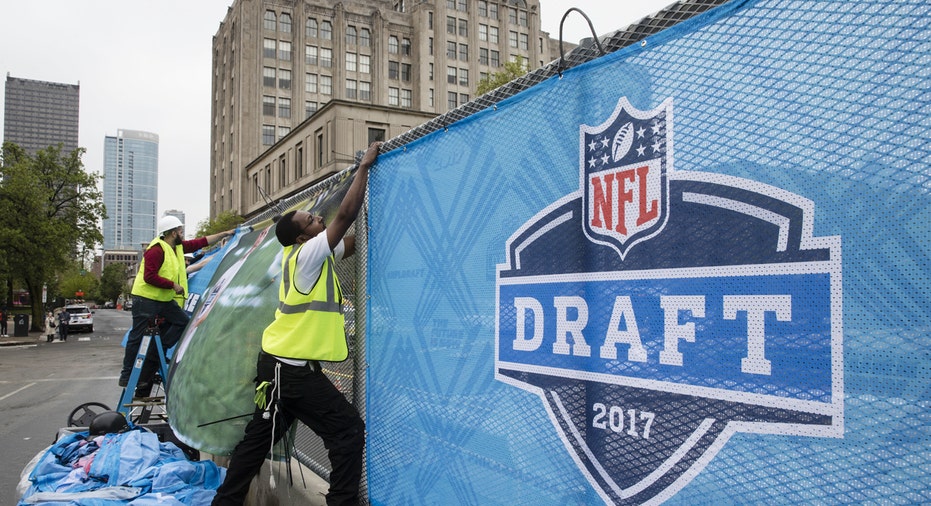Philadelphia NFL Draft Organizers Say Economic Pros Outweigh Cons

The Philadelphia officials responsible for bringing the 2017 NFL Draft to their city on Thursday are confident it will have a meaningful impact on the local economy, despite questions from critics as to whether the event is worth the inconvenience to residents.
The Philadelphia Convention and Visitors Bureau says the free-to-enter, multi-day fan festival brings measurable financial benefits, including more than $80 million in economic impact. The draft itself will be held on the “Rocky” steps outside the Philadelphia Museum of Art, while fan events like the NFL Museum and “Combine Corner” are situated along the Benjamin Franklin Parkway.
The event has some notable detractors. Some economists are skeptical that the NFL Draft produces as large an economic impact for the city as officials project, and local residents have been critical of the road closures and widespread construction the draft required. But Julie Coker-Graham, president and CEO of the visitors bureau, says the positives far outweigh the negatives.
“When you roll all of that up together – the exposure, the jobs that it’s creating, the visibility of our city and certainly continuing to build on our great brand, I think, overall, it’s a win,” Coker-Graham told FOX Business. “But we are certainly sensitive to those neighbors that are right on the parkway, and [we] have tried to minimize the inconvenience as much as possible.”
Philadelphia is the second city to secure hosting rights for the draft since 2014, when the NFL moved the event from New York City’s Radio City Music Hall and allowed bids from outside venues. Demand to host the event is strong – 23 cities have expressed interest in hosting the draft in the future, NFL senior V.P. of events Peter O’Reilly told Sports Business Journal.
Aside from more than $80 million in economic impact, Coker-Graham says the Philadelphia draft is expected to draw more than 200,000 fans from April 27 to April 29, 49% of which are from out of town. In addition, the 2017 event is projected to support more than 26,000 jobs in the hospitality, construction and transportation industries and result in more than 39,000 hotel room bookings.
Officials in Chicago, which hosted the 2015 and 2016 editions, had similarly bullish projections for what the draft would mean for the city’s economy. A joint study funded by Choose Chicago and performed by Temple University found the 2015 draft provided more than $81 million in economic impact, though the study’s methodology is unclear.
Allen Sanderson, a leading sports economist and senior lecturer at the University of Chicago’s Department of Economics, told FOX Business that statistics provided by event organizers or paid researchers should be given a cynical eye. In this case, Sanderson argues that $8 million, not $80 million, is likely a more accurate estimate of economic benefit to Philadelphia.
“Take any dollar figure some advocate, promoter or agency paid to dispense ‘fake news’ gives you about the economic impact and move the decimal point one [place] to the left – that’s pretty close to reality,” Sanderson said. “The NFL is not a 501(3)c charity. If the draft were really worth $80 million to the city of Philadelphia, why would the NFL leave that money on the table?”
The construction projects and street closures required to prepare Philadelphia for the draft generated some grumbling among residents. Local news outlets, including Philly magazine and the Philadelphia Inquirer, have recently noted that draft preparations have made it more difficult and time-consuming to drive through the city or visit landmarks.
Large sporting events tend to “crowd out” tourists that visit a city for other attractions, according to David Berri, a professor of economics at Southern Utah University. Any boost to spending at local hotels, bars and restaurants tends to evaporate once visitors leave the city, he added.
“One has to take into account how the event would impact the economic activity that was likely to happen anyway, [as] people tend to stay away from events that create large crowds,” Berri said. “Plus you have to note how much of the spending stays in the local economy – national events tend to bring in outside people who earn money and then take it with them when they leave.”
Coker-Graham says the conventions and visitors bureau has worked closely with local city groups, including the Logan Square Association and the Parkway Council Foundation, to minimize disruption to the lives of local residents. The city’s recent turns hosting the Catholic Church’s World Meeting of Families in 2015 and the Democratic National Convention in 2016 provided valuable experience about the do’s and don’ts of running large events, she added.
She argues that the NFL Draft will generate media exposure for the city’s biggest cultural attractions, promotion and spending at local businesses and a free event for local residents – all while establishing Philadelphia as a destination for major organizations and companies.
“These types of events continue to be a catalyst for us to go after other events for the future,” Coker-Graham said.



















